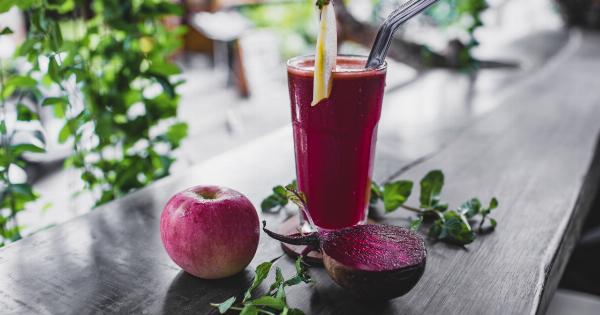When it comes to brain health, we are constantly searching for the next superfood that can enhance our cognitive abilities. While there are many foods that claim to boost brain function, one often overlooked powerhouse is beet juice.
Packed with essential nutrients and powerful antioxidants, beet juice has been shown to have numerous benefits for the brain. In this article, we will explore the science behind beet juice and why it should be a part of your daily diet.
The Nutritional Powerhouse
Beets are a root vegetable known for their rich color and distinct earthy flavor. They are loaded with essential vitamins and minerals that are vital for brain health.
One of the key nutrients found in beets is folate, which helps promote healthy brain function. Folate plays a crucial role in the production of neurotransmitters, the chemical messengers that allow our brain cells to communicate with each other.
In addition to folate, beets are also rich in nitrates. Nitrates are converted into nitric oxide in the body, which helps improve blood flow and oxygen delivery to the brain.
This increased blood flow can enhance cognitive function and improve overall brain health.
Boosting Brain Function
Studies have shown that consuming beet juice can have a positive impact on cognitive function. In a study published in the journal Nitric Oxide, researchers found that drinking beet juice improved brain performance in older adults.
The participants showed increased blood flow to the frontal lobes of the brain, which are responsible for functions such as decision-making, problem-solving, and attention span.
Another study published in the journal Physiology and Behavior found that the nitrates in beet juice can have a beneficial effect on mental performance.
Participants who consumed beet juice experienced improved reaction times and increased accuracy on cognitive tasks compared to those who did not consume beet juice.
Protecting Against Age-Related Cognitive Decline
As we age, our brain naturally undergoes changes that can lead to cognitive decline. However, research suggests that beet juice may offer protection against age-related cognitive decline.
A study published in the journal Frontiers in Aging Neuroscience found that the nitrates in beet juice can improve brain function in older adults. Participants who consumed beet juice showed increased blood flow to the brain and improved cognitive performance compared to those who did not consume beet juice.
Furthermore, the antioxidants found in beet juice help protect the brain against oxidative stress, which can contribute to cognitive decline.
A study published in the journal Food & Function showed that beet juice has powerful antioxidant properties that can help reduce inflammation and protect brain cells from damage.
Preventing Neurological Disorders
Beet juice may also play a role in the prevention of neurological disorders such as dementia and Alzheimer’s disease.
The nitrates in beet juice help improve blood flow to the brain, which can reduce the risk of cognitive decline and neurodegenerative diseases.
Additionally, the betaine found in beets has been shown to have potential neuroprotective effects. Betaine is a compound that helps protect cells from stress and inflammation.
A study published in the journal Proceedings of the National Academy of Sciences found that betaine supplementation can reduce the risk of Alzheimer’s disease and improve overall cognitive function.
Other Health Benefits
While beet juice is primarily known for its brain-boosting properties, it also offers a range of other health benefits.
The nitrates in beet juice have been shown to lower blood pressure, reduce the risk of heart disease, and improve athletic performance.
Furthermore, beet juice is packed with fiber, which aids in digestion and promotes a healthy gut. A healthy gut microbiome has been linked to improved mental health and cognitive function.
Beet juice is also a great source of vitamin C, which supports a healthy immune system and protects against oxidative stress.
Additionally, it is rich in minerals such as potassium, manganese, and iron, which are essential for overall health and wellbeing.
Incorporating Beet Juice into Your Diet
There are several ways to incorporate beet juice into your daily diet. One of the easiest ways is to juice fresh beets using a juicer. You can also find pre-packaged beet juice at most grocery stores and health food stores.
If you prefer a milder taste, you can mix beet juice with other fruits and vegetables to create a delicious and nutritious smoothie. Adding a squeeze of lemon or lime can also help balance the earthy flavor of beet juice.
It’s important to note that while beet juice offers numerous benefits, it should be consumed in moderation. Excessive consumption can lead to a condition called beeturia, which causes urine and stools to turn reddish or pinkish.
Conclusion
Beet juice is a nutritional powerhouse that offers a wide range of benefits for brain health. From boosting cognitive function to protecting against age-related cognitive decline, beet juice has proven scientific benefits.
Incorporating beet juice into your diet can be a simple and effective way to support brain health and overall wellbeing. So why not raise a glass of beet juice and toast to a healthier brain?.






























